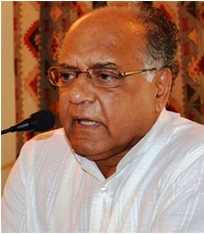
Mumbai, January 12: Former judge in the Bombay and Karnataka high courts, Justice Michael Saldanha has described Karnataka with having the worst communal-persecution record and a state that encourages terror on micro-minorities.
Addressing a press meet organised jointly by All India Secular Forum and Catholic-Christian Secular Forum(CSF) the retired judge said that while across the country there has been a marked decrease in communal-related violence between 65 per cent to 75 per cent, “In Karnataka the violence targeting minorities jumped up by 90 per cent.”
He warned that the current scenario “is so alarming that even a minor flash point in near future may turn the state into a communal inferno... if steps to rein in parochial forces are not taken in time.”
The retired judge who grew up in Mangalore said, “This was never the case during my schooling and college days. All communities used to live harmoniously. But now something is wrong and the partisan-nature of the state machinery can be seen clearly.”
Justice Saldanha who had recently carried out an in-depth study of communal-related violence, said: “I found that Catholic community is the worst affected by this kind of violence. False cases are registered against people from this community. All this shows that apart from the saffronisation of the police force...what has been unleashed in this once-a-peaceful region is state-sponsored terror.” Citing examples of violence meted out to people belonging to Catholic community, he said no action was taken against parochial organisations espousing Hindutva ideology through hate-speeches instigating majority community to carry out violent attacks on micro-minorities.
Elaborating the former judge's point, CSF general secretary Joseph Dias said that in Karnataka, “it has been found that micro-communities are worst affected in Dakshin Karnataka, Mysore and Mangalore.”
Dias said that going by the press reports also, “2011 has been the worst year for Indian Christians. Sheer number of attacks clearly point to the fact that the persecution has become more widespread.
“Moreover, even though there has been no major problem like Kandhamal in Orissa, one just has to see the fear glinting in the eyes of minority communities residing in interiors.”
Dias also claimed that the attacks on Christians have increased so much that the number of such incidents have over taken attacks on Muslims.







Comments
Add new comment